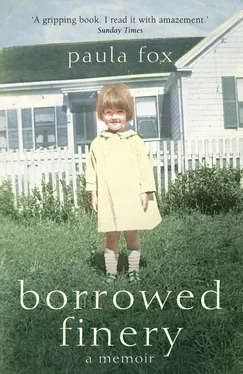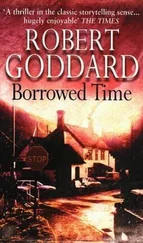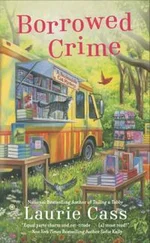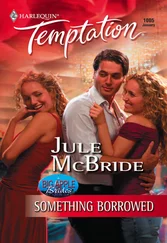Often at night, rarely during the day, and only when she was in terrible pain, I could hear through the closed doors between our bedrooms her gasps for breath, her faint cries, and Uncle Elwood’s efforts to comfort her. I would lie rigidly beneath the rose-colored blanket in my bed, imploring God to end what seemed endless, to let her fall asleep.
Sometimes when the thunder had diminished and only rumbled distantly, the minister would light a candle and carry his mother into the living room so she could see the dark wallpaper with its pattern of pussy-willow branches in bloom. She had chosen it decades earlier, when her husband was still living and she had been able to move freely about the house.
At an unexpected clap of thunder nearby, he would bring her back into the hall and return her to her chair, settling her into it as if she were a doll.
He told me with a humorous emphasis in his voice, so I would know not to believe him, that Henry Hudson and his crew were bowling somewhere up the river. But I half believed it.
When the minister’s only sister was visiting, and a fierce storm rumbled down the river and blew out the lights, she too sat with us in the downstairs hall, crocheting by lamp-light, her face with its pouchy cheeks bent over her work. She asked me to call her “Auntie,” which I did as seldom as possible.
As the pealing of the thunder weakened, the old woman and her daughter dozed. Their faces in repose looked sad, as if they had fallen asleep worn out by mourning a loss. Perhaps it was only a trick of the shadows.
I fell asleep too. Uncle Elwood carried me to my bedroom. As he drew up the blanket to cover me, I awoke and saw through my window the lights of Mattewan, a madhouse across the river, glittering among the leaves and branches that struck the panes fiercely as the wind blew.
Auntie had a married daughter who lived in Massachusetts. As far as I knew, she divided her time between that household and ours.
In winter, she regretted ceaselessly and aloud that the heat of the furnace, sent up through dusty registers in the floors of the living room and dining room, didn’t reach the bedrooms; in summer, that I made such a dreadful racket running up and down the stairs on my way in or out of the house it gave her headaches—why wasn’t there a rug to cover the landing?—and that the meals her brother fixed were skimpy and lacked variety—couldn’t he hire a woman on a regular basis to cook and clean, instead of the patchy arrangements with Mrs. So-and-So down the road?
She complained to her brother, when I was within hearing distance, that he gave too much time to certain parishioners of his church—whose services she attended rigorously, a baleful presence among the congregation.
Her voice was often shattered by fits of coughing. She smoked cigarettes, somewhat furtively, and carried a pack of them in a cloth bag, along with scraps of cotton or wool with which she rapidly crocheted small rugs and blankets in colors that suggested mud or blood or urine.
The cloth bag had a wooden handle and was embroidered with a design that made me uneasy. Perhaps it was the reddish entwined loops that led me to think of the copperhead snakes Uncle Elwood had warned me about, lurking in the woods in spring.
Auntie spent most afternoons murmuring to her mother, leaning over in a chair drawn so close to the wheelchair I thought she might topple over. She appeared to be about to creep into the old woman’s lap.
But the way she sat was not a posture of intimacy, I think now, or of childlike dependence. Even then I sensed there was resentment in the way she thrust her body at her mother, as though the older woman were still responsible for its miseries.
Could she be telling the story of her divorce over and over again? Uncle Elwood said that she and her husband no longer lived together. They had been divorced. Such an event had never before occurred in the family.
He looked startled as he spoke of it, as though the news had just reached him, although by the time he told me about it, it was old news. Could you escape from a divorce the way you could from a marriage? Was it possible to get a divorce from a divorce?
When the old woman’s windows were open and a breeze blew through the room, it wafted Auntie’s particular odor toward the doorway where I had paused on my way somewhere—a disagreeable smell composed of tobacco, mothballs, and the cough drops she sucked between cigarettes.
If she wasn’t crocheting or whispering to her mother, she followed me about the house, wheedling and hectoring by turns. She was the peevish serpent in the short-lived Eden of my childhood.
There was a three-legged stool in old Mrs. Corning’s bedroom that I sometimes moved from its usual place in a corner to her wheelchair and sat on, close to her motionless legs.
Earlier in the day, the minister would have lifted her to a sitting position on the edge of her bed, carried her to the bathroom, placed her on the toilet, waited outside the door until she signaled she was through, brought her back to her room, dressed her in one of her three or four print dresses, and carried her to the wheelchair in front of the bay windows, where she would spend the day until early evening, when he would carry her back to her bed.
She wore soft wool slippers.
She was as unmoving as a woman in a painting. When the day was fine, the sky unclouded, one of those blue American days full of buoyancy and promise that seemed to occur only when I was small, she might break the tranquil silence between us with a remark about the river. How beautiful it always was, she might comment, in her rather toneless voice. She could see Polpis Island and glimpse a bit of West Point just beyond the Storm King mountain. Then she would slip back into silence as though resuming a dream.
Uncle Elwood told me she had been a widow for many years. The dream might have been about her husband, how she had stood with him on the deck of a steamboat, northbound on the Hudson River, and he had seen the land that he would purchase months later to build a house on for her, this very house where she still lived, an old woman confined by illness to a wheelchair.
I looked at her hands, which lay on the wood tray fitted between the chair’s arms. They were so twisted they looked like small knobbed claws pointing at each other.
Very slowly, she bowed her head even farther down and smiled at me. It was an impersonal smile, as if pain had worn away any distinctive traits that might have defined her nature. As I looked up at the slight widening of her mouth, I imagined I recognized a kind of incorporeal kindness—and I think for those few minutes she was able to stand apart from her wounded body.
I couldn’t conceive of Uncle Elwood’s struggle to make do with the yearly salary he was paid by the church so that it would take care of his mother, himself, and me, along with paying for repairs to the ailing house, any more than I could have conceived of the lives of my parents unfolding somewhere in the world. And I would not have known how poor the Blooming Grove parishioners were, how they could barely afford a pastor of their own.
Behind his mother’s closed door, I could hear him telling her, in a voice made loud and incautious by desperation, that he had to replace the coal furnace—which he had to stoke every evening and morning when the weather turned cold—with an oil burner and that the house required a new roof. It leaked so shockingly, he said, he could fly to Jericho!
At his words, fly to Jericho, my heart jumped into my throat. It was the most extreme thing I ever heard him utter. He was at the end of his rope! It was the absolute limit!
His protests never lasted more than a few minutes, but the pictures that formed in my mind, evoked by the distress I heard in his voice—usually so serene, so playful—frightened me.
Читать дальше












